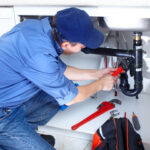Home » Posts tagged 'commercial plumbers'
Tag Archives: commercial plumbers
The Future of Plumbing
Plumbing involves the installation, maintenance and repair of piping and fixtures that provide potable water and remove waste. It also heats and cools a building.
A plumber with people skills can explain complicated issues in a way that makes sense to homeowners. They use clear language and avoid technical jargon. Contact Plumbing Express, Inc. for professional help.
Valve maintenance is an essential aspect of any industrial piping system. This is because valves are responsible for shutting off water access, directing flow, preventing reversal, and altering pressure. Industrial plants such as chemical factories, wastewater treatment facilities, and car production facilities use valves in their systems. Valves play a critical role in the overall functionality of these types of piping systems.
When it comes to selecting a material for your valves, you have many options. One of the most common is CPVC, which has become an increasingly popular choice for industrial use. It can handle a wide range of temperatures and can be used with a variety of chemicals. Additionally, it can withstand higher than average pressure levels.
To ensure that your CPVC valves will continue to work as intended for years to come, it is important to select the right kind for your specific needs. For example, it is important to consider the size of the valve and whether or not it will need an actuator. Additionally, you may need a valve that is suitable for use with corrosive materials.
There are many different types of valves available, each with its own unique design and function. For example, needle valves are characterized by their long, tapered plunger that moves up and down to control the rate of flow. This type of valve is ideal for precise flow rates and works best in low-diameter piping systems. Gate valves are another common type of valve. These are operated by raising and lowering a flat gate-like disk. These are best used in piping systems that do not require frequent opening and closing such as reservoir plumbing.
Other types of valves include diaphragm and plug valves. These valves operate by pushing or pulling a disc that opens and closes to regulate flow rates. The disc is often spring-loaded, making it more resistant to backflow.
In order to keep your valves in top condition, it is vital to follow recommended maintenance procedures. This includes regularly lubricating moving parts to reduce friction and utilizing inspection tools to spot any potential issues early on. You should also consider using predictive maintenance techniques such as vibration analysis and acoustic emission monitoring to prevent unplanned downtime. Additionally, it is important to install valves in locations that are properly supported and can withstand dynamic loads, such as vibrations and fluid pulsations.
Sewer Lines
A sewer line is the link between your home’s drains and the main sewer drain. Clogs in this line can lead to wastewater backing up into your house and exposing you and your family to health risks. The good news is that you can prevent most of these clogs by being vigilant about what goes down your home’s drains and taking steps to regularly clean your pipes.
Unlike your home’s drain lines, which are usually inside your walls or beneath your fixtures, the majority of your sewer line is located outdoors. For this reason, it is important to keep trees and other plants away from your sewer line to protect against infiltration by their roots. In addition, you should never flush items other than toilet paper and human waste down your drains. Food debris, grease, oil, and soap scum can build up in your drains and sewer lines over time, reducing their functional volume and putting you at risk for clogs and wastewater backups.
To prevent these problems, install drain strainers in your kitchen and bathroom sinks to catch large items before they go down the drains. You should also never pour grease or cooking oils down your drains and only flush toilet paper, human waste, and small amounts of toilet tissue down the toilet. For best results, have your sewer line professionally cleaned and inspected annually.
Your home’s plumbing system is a complex network of pipes that carry sewage and wastewater to and from your sewer line. Because sewage contains pathogens that can cause serious health problems, it is vital to keep your sewage and wastewater systems in good condition to avoid damage and clogs.
If you have a clogged sewer line, it is important to act quickly. Clogged sewer lines can cause wastewater to back up into your home, resulting in a wide range of issues, including flooding, water damage, and poor water quality. A professional plumber can identify clogs, leaks, and other problems in your sewer line and provide repairs and cleaning services.
It is also a good idea to learn about your sewer system and how it works. This can help you understand the complicated plumbing terminology your plumber uses and make it easier for you to maintain your pipes, sewer line, and other components of your plumbing system.
Tree Root Invasion
Tree roots are attracted to the nutrients and moisture found in sewer lines. When they invade a line, they cause blockages and can lead to expensive plumbing repairs. The best way to prevent this problem is by making sure trees are planted well away from your property’s sewer line.
It is also important to inspect sewer lines regularly and repair them as needed. If you notice signs of root invasion, contact a plumber immediately. Some common symptoms of a sewer line with root intrusion include:
If you notice a strong, rotten egg smell coming from your drains, this may be the result of a sewer or sewage backup caused by tree roots. In addition, if the toilets in your home have a clog that cannot be cleared with a plunger, this is another sign of a blockage due to tree roots.
A plumber can inspect your sewer pipes using a video inspection camera. This non-invasive process involves feeding a small camera through the pipe to see what is causing the problem. A plumber can then suggest options for addressing the issue, such as a chemical treatment or physical barrier.
In severe cases, a complete sewer line replacement may be necessary. This is a costly option, but it is often the best choice if you want to restore your sewer system’s functionality and avoid further damage to your home.
While it may seem counterintuitive, it is important to maintain a balance between nature and your plumbing system. Keeping trees and shrubs well away from your sewer line will help to prevent root intrusion. Additionally, maintaining regular inspections and maintenance can also reduce the risk of a costly root invasion in the future. Be proactive and invest in a lasting solution to protect your Seattle plumbing system from the consequences of invasive tree roots. For the best results, hire a professional plumber who offers trenchless sewer repair. This method is minimally invasive and allows your plumber to effectively treat the problem with little disruption to your property. Contact a local plumber today to learn more about the services they offer.
Industrial Plumbing
Plumbing is a crucial aspect of modern life, and the industry has come a long way from the rudimentary systems of ancient civilizations. The future of the plumbing industry is bright, with innovations in water-saving technologies, greener methods for waste management, and a growing awareness of environmental sustainability.
Industrial plumbing refers to the piping that connects toilets, sinks, showers, and other fixtures in industrial settings. This can include factories, power plants, and other production facilities. Plumbing in an industrial setting is more complex than that found in commercial or residential buildings, with the systems often being larger and more intricate. Industrial plumbers must have a keen understanding of building codes, regulations, and safety standards when working on these larger systems.
Like all plumbing, industrial pipes must be able to handle various temperatures and pressures. They must also be able to withstand rust and corrosion. For this reason, many industrial pipes are made of stainless steel or cast iron, with fittings ranging from valves to elbows and tees. These components help to maintain the integrity of the piping system, preventing leaks and other damage.
Because these pipes are often used in highly sensitive areas, such as hospitals and power plants, industrial plumbing requires a greater degree of sophistication than the standard home plumbing system. This includes backflow prevention devices, water heaters, and other appliances that can be damaged by chemical spills or sudden temperature changes. Industrial plumbers are familiar with the specialized needs of these systems and can provide the proper installation and maintenance services necessary to keep them running smoothly.
When it comes to maintaining the health and safety of your employees and customers, you can’t afford any downtime due to plumbing issues. This is why it’s important to have a reliable and experienced industrial plumbing contractor on hand. Not only will they be able to address any existing problems, but they will be able to detect potential issues before they arise, helping you avoid costly repairs in the future.
The industrial plumbing industry is a vast and varied one, with many unique challenges and opportunities for innovation. As we look to the future of plumbing, it’s clear that sustainable practices and smart technology will play an increasingly significant role in the evolution of our cities.




